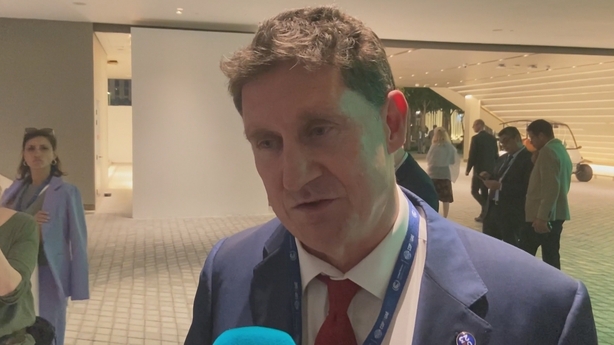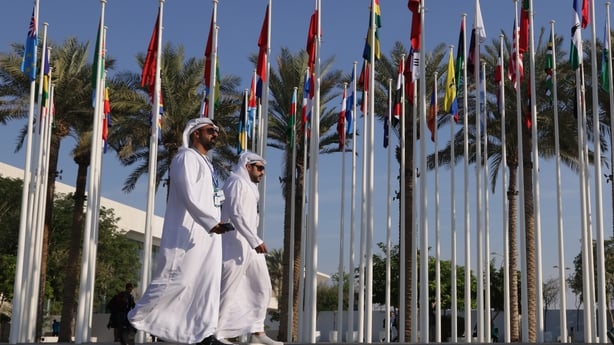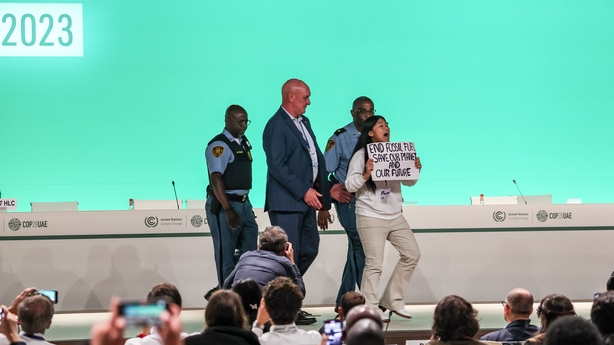Minister for the Environment and Climate Change Eamon Ryan has said that the draft text agreement circulated by the COP28 Presidency this afternoon will have to be reworked if it is to get across the line in Dubai.
Mr Ryan said that if the text was not improved dramatically, it could be grounds for walking away from it completely. However, he said that would not be a good or desirable outcome from this summit when the future of civilisation is in the balance.
Mr Ryan singled out paragraph 39 of the draft text, which talks about the "need for deep, rapid and sustained reductions in greenhouse gases", but with a call to parties to take action that "could" include a range of measures including "phasing down unabated coal" and "accelerating technologies" like removal technologies such as carbon capture and storage.
"We can't accept this text. It’s not anywhere near ambitious enough. It’s not broad enough. It’s not what parties have been calling for," Mr Ryan said.
He added: "If we start with paragraph 39 which goes to the heart of whether we phase out fossil fuel, that one word 'could’ just kills everything. We can’t have a get out of jail card for the fossil fuel industry and the current text would give them that."

He said that there were some small openings with regard to the language on climate finance (paragraphs 119-124) but again it was not nearly strong nor specific enough to give the clear signal that this COP needs to give to financial markets and investors.
"We have to hugely strengthen the finance sections. We need to phase up the opportunities to invest in renewables, particularly in the developing world.
"However, above all, we need clear mechanisms for implementation so that we can begin to work on changing the global financial systems to incentivise investment in renewable energy systems and in adaptation (like water supplies and climate smart agriculture).
"These are critical for developing countries. We have to stitch climate justice into every part of this text and we are not anywhere near that yet."
Mr Ryan was appointed as a lead EU negotiator on climate finance along with his French counterpart.
"We need to open up finance. We need to phase up the opportunities to invest in new clean technology, particularly in the emerging and developing economies. And this text doesn't provide that opportunity.
"If this doesn't change, yes, we will walk away. This is not acceptable," he said.
EU climate commissioner Wopke Hoekstra also expressed disappointment over the proposed, which falls short of calling for a phase-out of fossil fuels.

"There are a couple of good things in there, but overall it is clearly insufficient and not adequate to addressing the problem we are here to address," she told reporters, adding that the documenting contained elements he "simply cannot accept".
The US also called for stronger language on fossil fuels.
"We appreciate the effort on the part of many to produce the text, which seeks to balance a variety of interests," a State Department spokesperson said.
"At the same time, the mitigation section, including the issue of fossil fuels, needs to be substantially strengthened, and the finance section contains inaccuracies that must be fixed."
The Emirati head of the COP28 climate talks earlier proposed a compromise on the future of fossil fuels, endorsing a major reduction but not calling for their phase-out, in an 11th-hour bid for consensus that outraged environmentalists who hoped for a historic turning point.
With hours to go before the official end to the 13-day UN summit, COP28 president Sultan Al Jaber released a new draft agreement aimed at bringing onboard the nearly 200 countries, which include Saudi Arabia and other producers seeking to preserve their economic lifeblood.
After an earlier draft listed the landmark option of a "phase-out" of oil, gas and coal, the new text draft focuses on "reducing" their production and consumption in order to achieve net-zero emissions by 2050.
Mr Al Jaber - whose role as president of the UAE national oil company has drawn suspicion from environmentalists - called his text a step forward and said he still sought "high ambition" on the fossil-fuel language.
"We have made progress but we still have a lot to do," he said in a plenary session.
But small island states that fear that climate change threatens their very existence accused the Emiratis of ignoring their interests.

"The Republic of the Marshall Islands did not come here to sign our death warrant," said its negotiator John Silk, demanding an end to fossil fuels.
Environmentalists said the text was woefully inefficient in checking warming at 1.5C above pre-industrial levels - the goal blessed by the 2015 Paris accord to avoid the worst ravages of climate change including worsening storms and droughts and rising sea levels.
"This disastrous new draft is way less ambitious than the last version. This is disappointing," said Fernanda Carvalho of the WWF conservation group.
The text does not go so far as to demand actions on fossil fuels, only presenting measures that nations "could" take.
"A list of crucial actions has become a menu to pick and choose from," said analyst Dave Jones of Ember's Global Insights Lead.
"And the main course doesn't even include a fossil-fuel phase-out."
Negotiators who have spent 12 days in the glitzy metropolis built on petrodollars were expected to work through the night, with few expecting an agreement in time by the official close on Tuesday.
French negotiator Agnes Pannier-Runacher, heading into talks among European Union members, said the bloc would work for an ambitious text.
"Some changes have been encouraging but others seem to me to be a retreat from our expectations," she said.
The draft agreement says countries can take action that includes "reducing both consumption and production of fossil fuels, in a just, orderly and equitable manner so as to achieve net zero by, before, or around 2050 in keeping with the science".
On coal, the dirtiest major form of energy, the text lists limitations on "new and unabated coal power" - meaning going ahead with potential projects that use new carbon capture and storage (CCS) technologies.
The text does list an option of "phasing out" of "inefficient fossil fuel subsidies" that encourage "wasteful consumption".
UN Secretary-General Antonio Guterres called earlier for negotiators to show "maximum ambition and maximum flexibility".
"We are in a race against time," Mr Guterres told reporters. "It's time to go into overdrive to negotiate in good faith."
Mr Guterres called on negotiators to have a "single-minded focus on tackling the root cause of the climate crisis - fossil fuel production and consumption".
COP28 is taking place at the end of the hottest year on record with scientists believing it may be the warmest in more than 100,000 years.
Climate-related disasters in 2023 have included drought in the Horn of Africa and severe wildfires in Canada, Greece and Hawaii.
In a rare display of unity between rival powers, China and the United States, the world's two largest emitters, have largely been cooperating to advance language on a phase-out, with veteran US negotiator John Kerry pushing for a success as he celebrated his 80th birthday.
The latest draft deal includes language similar to a joint US-China statement released last month.
The COP28 deal calls for accelerating the deployment of zero and low-emissions technologies, including renewables, nuclear power and CCS "so as to enhance efforts towards substitution of unabated fossil fuels in energy systems".
Critics say carbon capture technology remains too expensive and would never be enough on its own to meaningfully reduce emissions.
Read more:
Lots of talk at COP28, but nobody seems to want to pay
Latest climate change stories







